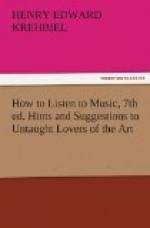[Sidenote: Modern designations.]
[Sidenote: German opera and Wagner.]
These distinctions we meet in reading about music. As I have intimated, we do not concern ourselves much with them now. In New York and London the people speak of Italian, English, and German opera, referring generally to the language employed in the performance. But there is also in the use of the terms an underlying recognition of differences in ideals of performance. As all operas sung in the regular seasons at Covent Garden and the Metropolitan Opera House are popularly spoken of as Italian operas, so German opera popularly means Wagner’s lyric dramas, in the first instance, and a style of performance which grew out of Wagner’s influence in the second. As compared with Italian opera, in which the principal singers are all and the ensemble nothing, it means, mayhap, inferior vocalists but better actors in the principal parts, a superior orchestra and chorus, and a more conscientious effort on the part of conductor, stage manager, and artists, from first to last, to lift the general effect above the conventional level which has prevailed for centuries in the Italian opera houses.
[Sidenote: Wagner’s “Musikdrama."]
[Sidenote: Modern Italian terminology.]
In terminology, as well as in artistic aim, Wagner’s lyric dramas round out a cycle that began with the works of the Florentine reformers of the sixteenth century. Wagner called his later operas Musikdramen, wherefore he was soundly abused and ridiculed by his critics. When the Italian opera first appeared it was called Dramma per musica, or Melodramma, or Tragedia per musica, all of which terms stand in Italian for the conception that Musikdrama




